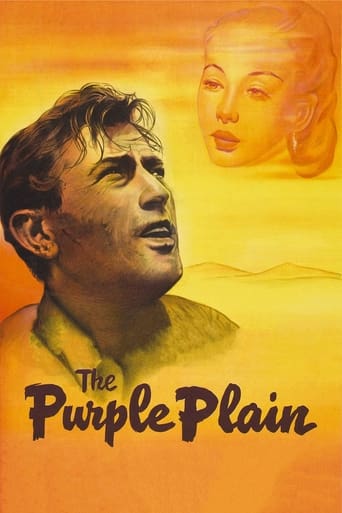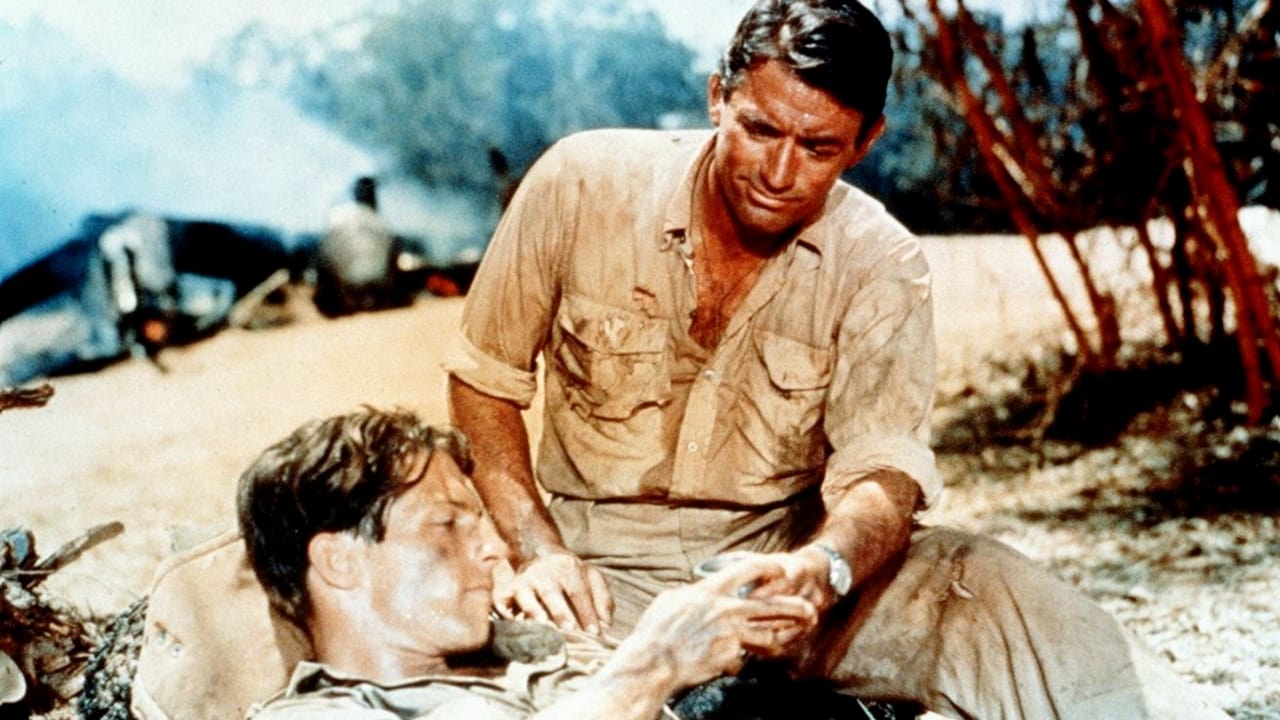Leofwine_draca
THE PURPLE PLAIN is a character-based WW2 drama set the wilds of Burma. It's based on a novel by H.E. Bates and was shot in Sri Lanka for extra authenticity. The film's ace is in the casting of Gregory Peck in the lead role; he handles a complex and in some ways ambiguous role very well indeed and gives the viewer a reason to watch. The film is in parts a romance and a survival epic, and with the true to life characters it remains readily watchable.
sol-
Set in Burma during World War II, this curiously titled film follows the experiences of a Canadian bomber pilot with severe emotional and psychological issues. The film opens on a strong note with a violent air raid that turns out to be just a nightmarish delusion, and the film employs sound (especially accentuated audio as the protagonist tries to sleep) very well early on. Gregory Peck's lead performance is the film's best asset though; excessively sweating and visibly distressed throughout the whole first hour, Peck offers an excellent human anchor into this tale of overcoming wartime trauma. The second half of the movie is not quite as strong with Peck settling a down a bit too much and too easily after falling in love with a young local woman. Almost the entire second half of the movie also involves Peck finding safe passage from behind enemy lines after a plane crash, which is not quite as engaging to view with Peck's psychology forced to take a backseat to his quest to survive. Never to mind, the film still ends on a strong note and Peck has several good moments towards the end interacting and arguing with co-stars Maurice Denham and Lyndon Brook, who crashed with him. The film does a solid job dispersing flashbacks to Peck's past throughout too as we gradually learn just why he is so mentally scarred. As for the significance of the title though, it is anybody's guess.
dougdoepke
Purple Plain is an obscure film in Peck's long list of movie credits. I don't know if this British production got much publicity or release stateside, despite Peck's movie star celebrity. Unfortunately, it's never been a TV regular, which is too bad because this tale of renewal and survival is an unusual and gripping one, in spite of the obscurity.The film opens in the Burmese jungle during WWII. Peck is a battle fatigued flyer on the ragged edge of breakdown. He's about to be relieved because of erratic behavior, all the while he's flashing back on his wife's death in a London air-raid. These are well-done scenes causing us to sympathize with his loss. Nonetheless, he's jeopardizing his comrades with reckless manuevers because the loss has undermined his will-to-live. Thus, we're torn between sympathy and concern, just like the flight station doctor (Bernard Lee).In an interesting move, Lee overcomes Peck's agonies by reconnecting him socially, in this case with a nearby missionary community. There Peck finds the vital human relationships so importantly missing from his death-dealing combat duties. As a result, his life takes on new meaning and purpose as a result of rejoining a human community where such life-giving affirmations can emerge. On the whole these are well-done scenes, especially the chaos from the Japanese air attack. In the midst of the carnage, Peck's combat flyer finds a new role in helping to bandage up survivors. Herein lies the movie's basic message and it's an important and humane one, conveyed in fairly subtle fashion, though the turn-around occurs more quickly than I would have liked.Nonetheless, it's interesting that the script avoids the usual officially sanctioned head-doctor therapies. Note that Peck is not sent to be counseled by an air force psychiatrist, nor to join a chest-baring therapy group, nor to have his past puzzled together Freudian style. Of course, the happy solution here remains a "movie" solution where-- as we all know-- anything can be made to magically happen. Still, for a war-movie setting, the simple affirmation that mental health lies through nurturing social relations and not through government sanctioned killing remains no less suggestive because of its movie origins.The remainder of the film amounts to a survival trek through the wilds of southeast Asia. It's a well-filmed and harrowing struggle against a forbidding landscape where the crash survivors must decide between staying put or hiking out against great odds. But most importantly, it's Peck's chance to regain his humanity by facing up to the odds, not just for his own survival, but for his two comrades as well. The movie's final scene could not have been better conceived. Indeed, no words are necessary. On the whole, this is a subtly and well thought out anti-war film, no less effective because it concerns the fate of one man rather than thousands.Too bad that its humane message remains so generally unseen.
Marlonius
I hadn't even heard of this movie until recently. I'm an aviation/WW2 fan, and I've always enjoyed Gregory Peck's films, so I figured what the heck.Peck plays an emotionally scarred Canadian pilot flying with Commonwealth pilots in Burma in WW2. It looks like the planes they fly are done in Australian Air Force Markings, but I'm not certain on that count.As other reviewers have stated, he meets a nice Burmese girl, and begins to come back emotionally. Unfortunately, he's downed in the wilderness with and injured man and a third uncooperative officer.The story is somewhat predictable, and by the numbers for sure. I feel that it has aged relatively well though due to the largely excellent characterizations created by the actors and author. Of course, the special effects in this 52 year old film aren't up to today's standards, but I found them passable.The film is beautifully shot and the location photography often breathtaking.My only gripes are minor, the kind of thing that prevented the film from being a 10 in my books.: The officer who is burned in the crash lies there like an idiot, screaming until his companions throw sand on him to put out the flames. He had the stop and drop, but neither will do any good without the roll. Plus, the gore/makeup standards of the day prevented the filmmakers from showing anything truly horrific, so his injuries seemed pretty minor. The script required one of the three to be incapacitated, and the could have/should have come up with something better, like 2 broken legs.The character of Bloor is a little too one dimensional, and the conflict between him and Forrester is much too on the nose. Surely a more subtle rising disagreement could have been created.Minor mistakes that no person in his right mind would have made if it were real: After Bloor dies, Forrester leaves his hat there. As I watched it, I was saying to myself: "Grab that hat".When Forrester leaves the navigator to march on by himself, he doesn't move him under shelter so that he'll have shade when the sun comes up. Plus he takes only one empty canteen with him on his quest for water.On the plus side, there were some nice touches that I found very good. I really enjoyed the interaction between Forrester and Ana. I thought it was well acted, written and filmed.I also found the picture of Bloor's wife and family very touching. Before dying, the last thing he did was look at this picture of his wife, whom we are previously informed is the love of his life. When we the audience finally see the picture, she's an average to homely looking woman. For me that greatly enhanced the realism of Bloor's character and the finality of his death.And finally, the movie had excellent production values, good plane footage and dirt under the nails location photography.Check it out!


 AD
AD


